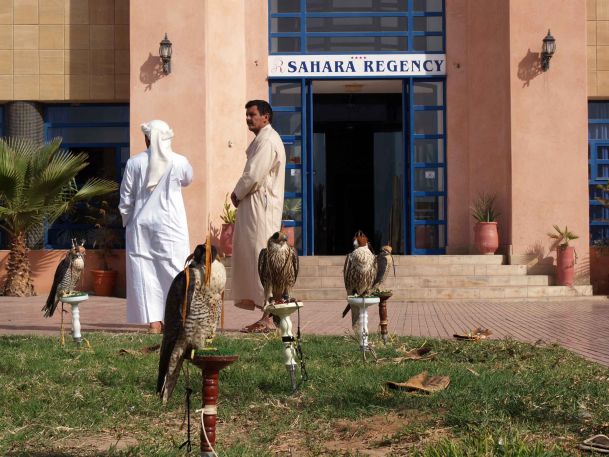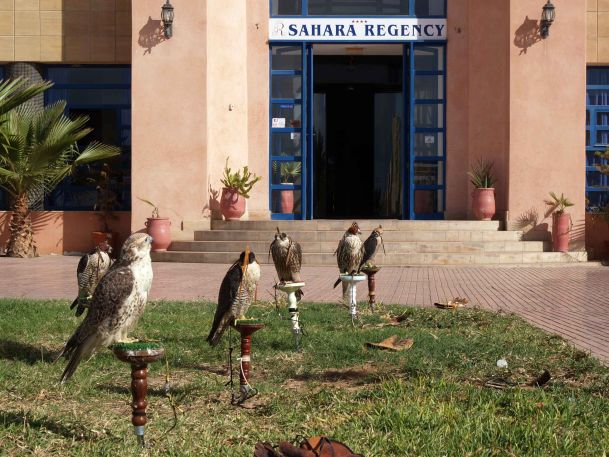Qataris hunt vulnerable birds in Western Sahara

Morocco invites Qatari businessmen to kill a vulnerable bird species in occupied Western Sahara.
Published 26 September 2010
These photos were recently taken outside the Sahara Regency Hotel in Dakhla, Western Sahara. The photos shows Qatari guests resting before taking the flight home. The group had just finished a hunting expedition in Western Sahara.
In the front, a group of hunting falcons.
Morocco regularly hosts Qatari guests to kill vulnerable bird species. Their main quarry is the wildly prized Houbara Bustard (Chlamydotis undulata), who's conservation status is 'vulnerable'. The same bird has led to diplomatic disputes between Saudi Arabia and Pakistan, due to the allocation of hunting rights.
The recent Qatari hunting expedition in Dakhla was described by its members as "excellent" with kills of 200 plus birds per day reported, Western Sahara Resource Watch has been told. As this photo was taken, their staff had to work over time to preserve and pack their trophies ready for shipment.
Also disturbing was the fact they where allowed to import weapons for the protection of their falcons. These were used on one occasion to kill a golden eagle that was disturbing their sport by its presence.
The Qatari visits in occupied Western Sahara is a regular event.
WSRW in 2007 revealed images of a Saudi bird hunt expedition further north in occupied Western Sahara.
The Kingdom of Morocco has been a party of the Convention on Bidiversity since 21 August 1995 by ratification. But Western Sahara is not. It’s still on the United Nations list of non self governing territories.
"At the moment the international community’s eyes are on the violations of human rights by the Moroccan colonial authorities. Morocco imposes severe punishment on every woman, or man, or even child, who insists on the right to self- determination. The kingdom of Morocco blocks WebPages, shields independent observers and evicts international reporters, trying to hide its repressive actions in the colony from the international public. Scientific research as all other forms of independent research is severely impeded. So it is not easy to ascertain how Moroccan colonialism has influenced the country’s biodiversity.", wrote Axel Goldau in 2007 in the report Western Sahara - The destruction of biodiversity by modern colonialism.
Click on photos for high resolution.


News
Saudi bird hunt
A Saudi Arabian bird hunting expedition in occupied Western Sahara is now caught on photo.
11 December 2007
Ryanair announces flights to occupied territory
The Irish airline has announced a new route to Dakhla in “Morocco”, praising the occupying power for its ”support and vision in securing this major investment".
19 November 2024
Morocco PR campaign in the heart of the EU
From early May, the Royal Air Maroc ran a propaganda campaign in Strasbourg selling trips to the occupied territory of Western Sahara.
15 June 2023
Saharawi government launches climate plan
Here is the Saharawi people’s contribution to the global fight against climate change, presented at a side-event of COP26 today.
08 November 2021



